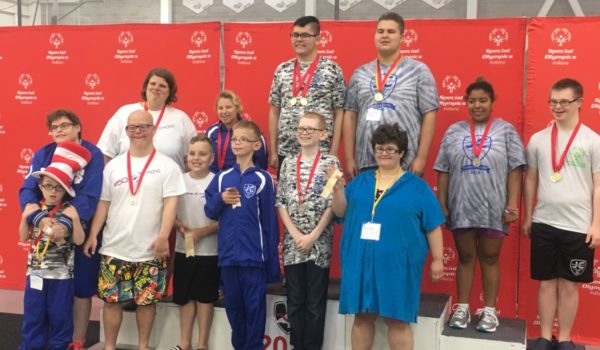
Athletes learn winning ways with Special Olympics Johnson County
By Jenny Elig
Liam Price is built like a linebacker, but when he stepped onto the field at Lucas Oil Stadium, he came not as a pro player. He came to toss a football into a tiny Ray’s trash truck to earn money for Special Olympics Indiana. It was a fitting demonstration of his talents. After all, Liam came with the confidence of hours of practices with his dad and with the poise honed by his time spent as a Special Olympics Johnson County athlete.
Liam took his three shots, first from 50 feet away, then 100, then 150. He made them, earning $1,000 for an organization that’s given him an outlet for his athletic abilities.
The athlete
He was not always interested in athletics, his mom, Cindy Price, explains. A younger Liam dipped his toes into the water, so to speak, through SOJC’s programs, but nothing quite held his interest the way geometric shapes, space and planets did.
That changed, Cindy says, when a ruptured appendix landed Liam in the hospital; many treatments later and he “started finally just feeling good,” Cindy says. “Then it was almost overnight. He started showing an interest in sports and not just basketball or swimming. I mean, he wanted to do everything.”
One by one, Liam began trying sports: first swimming, then basketball, followed by football. “He’s doing Unified sports at the school, which is also a partnership with Special Olympics,” Cindy says. “He just loves being busy and active, and it’s kind of spilled over into his life even outside of Special Olympics.”
SOJC activities are competitive, she says, but not all or nothing, “so (Liam) doesn’t get the anxiety of worrying about disappointing anybody,” she says. “It truly is just all about him doing his best. They have a motto that they say before every tournament and before the summer games. It says, ‘Let me win, but if I cannot win, let me be brave in the attempt.’”
The organization
Chances are, you’ve heard of Special Olympics. An international nonprofit, the organization is dedicated to empowering people with intellectual disabilities. Special Olympics Johnson County is the local chapter, providing year-round sports training and athletic competition in a variety of sports.
SOJC has a wide array of competitive opportunities, in games such as bowling, volleyball, softball, golf and basketball, says Linda Boothe, who has held SOJC’s county coordinator role for a little more than a year. SOJC also offers Athlete Leadership Program, which trains athletes to serve on the board of directors or local organizing committees; and the Motor Athletes Training Program, which provides participation for individuals with significant disabilities requiring the greatest assistance and support.
Unified Sports promotes individuals with and without intellectual disabilities partnering on the same team for training and competition. SOJC runs Project Unify, a program that aims to create a positive, inclusive school climate through a variety of Special Olympics programs. If you have a younger athlete, SOJC’s Play Skills, offered to children ages 2 to 7 with disabilities, is intended to increase their strength and coordination for participation in sports and prepare them for future competition.
SOJC operates without a dedicated facility — activities take place in Johnson County schools and church facilities — and solely through volunteer efforts.
The coordinator
Boothe first came to SOJC when her daughter, Chelsea Davis, was a junior in high school. Now 30, Davis serves on the SOJC county management team as an athlete representative. But Boothe wanted to fill in particular gaps that school programs didn’t address. She wanted Davis to be more outgoing, to gain more friends and learn how to work as a teammate. Boothe, a pharmacist, is retired from Lilly, where she worked as the product complaint coordinator; she joined the board several years ago, first serving as treasurer and now as county coordinator.
SOJC has few requirements for its athletes: They have to be at least 8 years old. Athletes do not age out of the programs, and some players are in their 70s and 80s. The best thing about SOJC, Boothe says, is that it “gives the athletes the ability to play at their skill level with their age level.”
Her role includes tasks her title would imply: She coordinates games, volunteers and facilities used for the organization’s games. She also shows up for most practices and games, which will take place around Johnson County throughout most weeks of the year. Then there are the organization’s special events: dances and mixers, and the Special Olympics Summer Games in Terre Haute.
It’s a hefty role, but, Boothe emphasizes, it’s not one she shoulders alone. Plus her involvement with SOJC might take time, but it “just makes me feel better. I think I have become more tolerant in my working life. I worked with people across the globe, but this is just a different type of learning,” she says. “These athletes are special people. They have lots to give and I think everyone needs to realize that.”
The coach
Not every SOJC volunteer has a family member who’s a Special Olympics athlete. By day, Dave Kwilosz serves as a project manager for an Eli Lilly engineering group. In his off hours, he is a partner on a unified bowling team and coaches an SOJC softball team and a juniors basketball team.
His wife, Rachael Kwilosz, serves as the business liaison on the SOJC county management team. When their daughter, Allison, a volunteer partner on the Unified bowling team, no longer had the time to participate, Dave Kwilosz offered his time. “They said well, ‘Who’s going to take her place?’ I kind of looked left and looked right, and I guess I was the one to take her place,” he says. “It’s being in the right place at the right time.”
Since then, his involvement with SOJC has grown. Once certified to volunteer, Kwilosz was paired with a 20something partner in Unified bowling; in the coming months, the team will travel to Las Vegas to compete against other bowling teams. Being a Unified partner is about more than showing up to bowl and then leaving, Kwilosz says.
He also started coaching a softball team earlier this year. “I’ve never coached softball in my entire life, but they came and asked, and so I said OK,” he says. Kwilosz soon recruited another volunteer, his friend Carl, who also has no family members participating as SOJC athletes. “He was our third base coach, and I’ve never seen him appear happier than when he was standing on third base yelling at kids to keep running.”
“In this environment, (winning is) not a measure of whether it was a good day,” Kwilosz says. “I don’t feel like someone’s showing up looking for me to give them something. I feel like everyone’s showing up with the same objective, and that is to be active and to enjoy themselves. I don’t feel drained when I walk away from an event; I feel energized.”
Which takes us back to the Special Olympics motto. Ever brave, Liam modifies it slightly; after all, for this athlete “let me” is a bit forceful. He begins his statement with, “I hope I can win.” “Hope” is a word well-suited to Liam and a trait that was imbued in part by the SOJC.
After he successfully landed his footballs in the trash truck, earning $1,000 for Special Olympics Indiana, he says he “felt very good. I felt glad that that money was going toward Special Olympics.”


